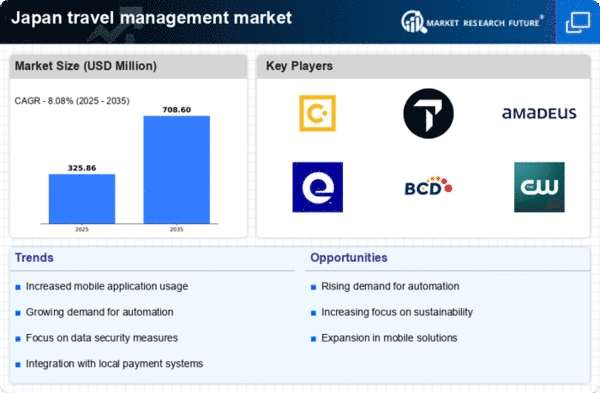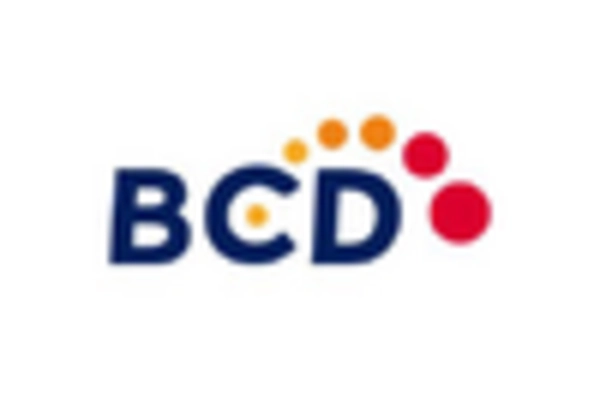Expansion of Remote Work Policies
The travel management-software market in Japan is significantly impacted by the expansion of remote work policies. As organizations adapt to flexible work arrangements, the need for effective travel management solutions becomes increasingly apparent. Companies are seeking software that accommodates remote employees' travel needs while ensuring compliance with corporate policies. This shift is likely to drive demand for travel management solutions that offer seamless integration with remote work tools and platforms. Recent data suggests that businesses implementing remote work policies experience a 15% increase in travel-related productivity. Consequently, the travel management-software market is expected to evolve, with providers focusing on features that support remote work dynamics, such as virtual collaboration tools and real-time travel updates. This trend indicates a transformative phase for the market, as it aligns with the changing nature of work in Japan.
Rising Demand for Cost Efficiency
The travel management-software market in Japan experiences a notable surge in demand for cost efficiency among businesses. Organizations are increasingly seeking solutions that streamline travel processes, reduce expenses, and enhance overall productivity. According to recent data, companies utilizing travel management software report an average savings of 20% on travel costs. This trend is driven by the need to optimize budgets and allocate resources more effectively. As businesses face economic pressures, the emphasis on cost-effective travel solutions becomes paramount. Consequently, the travel management-software market is likely to witness growth as firms prioritize tools that provide detailed insights into spending patterns and facilitate better decision-making. This focus on cost efficiency is expected to shape the competitive landscape, prompting software providers to innovate and offer tailored solutions that meet the evolving needs of Japanese enterprises.
Growing Emphasis on Employee Experience
The travel management-software market in Japan is witnessing a growing emphasis on enhancing employee experience. Organizations recognize that a positive travel experience contributes to employee satisfaction and productivity. As a result, companies are increasingly investing in travel management solutions that prioritize user-friendly interfaces and personalized travel options. Recent surveys indicate that 70% of employees prefer travel management software that offers flexibility and convenience in booking processes. This trend reflects a broader shift towards employee-centric policies, where businesses aim to create a supportive travel environment. By focusing on employee experience, organizations not only improve morale but also enhance retention rates. This focus on user experience is expected to drive demand for innovative travel management solutions, thereby influencing the trajectory of the travel management-software market in Japan.
Increased Regulatory Compliance Requirements
The travel management-software market in Japan is influenced by the growing emphasis on regulatory compliance. As businesses navigate complex legal frameworks and industry standards, the need for software solutions that ensure adherence to regulations becomes critical. Companies are increasingly adopting travel management software that incorporates compliance features, such as automated reporting and policy enforcement. This shift is driven by the necessity to mitigate risks associated with non-compliance, which can result in substantial financial penalties. Recent studies suggest that organizations utilizing compliant travel management solutions experience a 25% reduction in compliance-related issues. Consequently, the demand for software that facilitates regulatory adherence is likely to propel growth in the travel management-software market, as businesses prioritize risk management and operational integrity.
Technological Advancements in Software Solutions
Technological advancements play a crucial role in shaping the travel management-software market in Japan. The integration of artificial intelligence (AI) and machine learning capabilities into travel management solutions enhances user experience and operational efficiency. These technologies enable predictive analytics, allowing businesses to anticipate travel needs and optimize itineraries. Furthermore, the incorporation of automation features reduces manual tasks, freeing up time for travel managers to focus on strategic planning. As organizations increasingly adopt these advanced technologies, the travel management-software market is poised for significant growth. Reports indicate that the adoption of AI-driven solutions could lead to a 30% increase in efficiency for travel management processes. This trend underscores the importance of innovation in maintaining competitiveness within the market, as companies seek to leverage cutting-edge technologies to improve their travel operations.
















